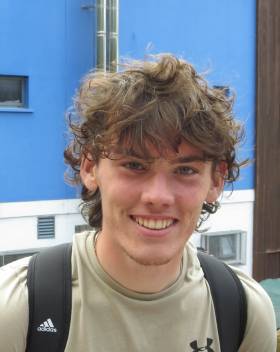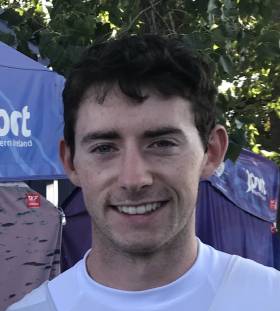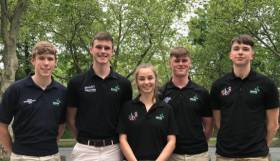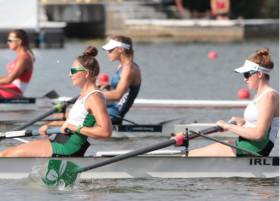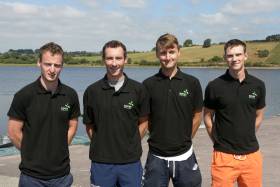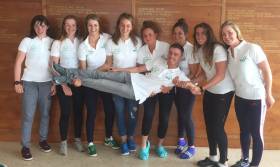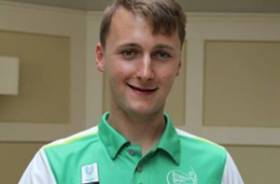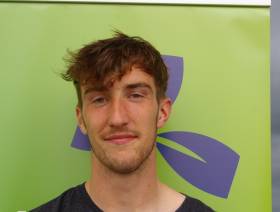Displaying items by tag: Under23
Ronan Byrne In A Final at European Under-23 Championships
#Rowing: Ronan Byrne won his repechage and will compete in the A Final of the men’s single sculls at the European Under-23 Championships in Ioannina in Greece on Sunday. Lightweight single sculler Hugh Moore will compete in the B Final and the double of Ross Corrigan and Alex Byrne the C Final. Both crews placed fourth in their repechages.
European Under-23 Championships, Ioannina, Greece, Day One (Irish interest)
Men
Double Sculls – Heat One (First Three to A/B Semi-Finals; rest to Repechage): 4 Ireland (A Byrne, R Corrigan) 6:46.07. Repechage (First Three to A/B Semi-Finals; rest to C Final): 4 Byrne, Corrigan 6:50.42.
Single Sculls – Heat One (First to Final; rest to Repechage): 2 R Byrne 7:06.43. Repechage (First Two to A Final; rest to B Final: 1 Byrne 7:11.85
Lightweight Single – Heat One (First to Final; rest to Repechage): 5 H Moore 7:38.67. Repechage (First Two to A Final; rest to B Final): 4 Moore 7:21.09.
Women
Four, coxed – Exhibition/Race for Lanes: 3 Ireland 7:24.60
Ireland Crews Set For Repechages at European Under-23 Championships
#Rowing: Ireland’s first outings at the European Under-23 Championships in Ioannina, Greece, sent three of the four crews to repechages. Ronan Byrne, who took silver in the double sculls at the senior World Championships, needed to win his heat of the single, but finished second behind Stefanos Ntouskos of Greece. The men’s double and lightweight single will also have to compete in repechages to progress.
The women’s coxed four finished third in their five-boat race for lanes.
European Under-23 Championships, Ioannina, Greece, Day One (Irish interest)
Men
Double Sculls – Heat One (First Three to A/B Semi-Finals; rest to Repechage): 4 Ireland (A Byrne, R Corrigan) 6:46.07.
Single Sculls – Heat One (First to Final; rest to Repechage): 2 R Byrne 7:06.43.
Lightweight Single – Heat One (First to Final; rest to Repechage): 5 H Moore 7:38.67.
Women
Four, coxed – Exhibition/Race for Lanes: 3 Ireland 7:24.60
Ronan Foley Sixth in World Under-23 Final
#Canoeing: Ronan Foley finished sixth in the A Final of the men’s K1 1,000 metres at the canoe sprint World Under-23 Championships today in Pitesti, Romania. Thomas Green of Australia won gold, with Germany’s Jakob Thordsen second and Hungary’s Adam Varga third. Foley, in his first year since moving up from junior, came in 8.24 seconds behind Green.
Greenblades Allows Public to Support Up-and-Coming Rowers
#Rowing: Rowing Ireland has launched Greenblades, an initiative to help fund the junior, under 23 and development teams by means of donations. Currently, development rowers often call heavily on support from their families, as well as Rowing Ireland and whatever other funding they can muster.
It takes a lot to be an international rower and stars like Sanita Puspure, Paul O’Donovan and Gary O’Donovan have been supported in their development before they reached the top level in the world.
Rowing Ireland says that Greenblades will ensure that athletes who are representing Ireland will be supported to reach their full potential so that they can compete at the highest level possible.
Rowing Ireland’s chief executive, Michelle Carpenter said: “It is key that we do everything to support our up-and-coming athletes as we prepare to successfully support their future careers by giving them the opportunity to row in Paris [the 2024 Olympic Games] and beyond.
She said that the athletes are the future of Irish rowing. Consideraton must be give to the next two years, but also the next four and eight years.
“Rowing should be accessible to everyone who wants to compete, be it at domestic or high-performance level,” Carpenter added.
Rowing Ireland says that all donations will go directly to the athletes who will be competing at the World Under-23 Championships in Florida and the World Junior Championships in Tokyo.
Donations can be made at greenblades.ie
Noel Hendrick Straight Through to European Semi-Final
#Canoeing: Ireland paddler Noel Hendrick qualified for the semi-finals at the European Under-23 Championships today. The K1 competitor went straight through from the first run, taking 13th with a round with no touches at Liptovsky Mikulas in Slovakia. Eoin Teague fell just outside qualification in the same event in the second run.
Thirty of the 61 paddlers made it through to the semis. Hendrick will go off in the final 15 in the semi.
#Rowing: The Ireland women’s pair of Emily Hegarty and Tara Hanlon finished sixth in the semi-final at the World Under-23 Rowing Championships at Poznan, Poland. The race ran away from Ireland. Chile and then the United States, who would win, battled it out ahead of them, with Greece finishing brilliantly to take the third qualification spot for the A Final. Ireland lagged in sixth throughout and will compete in the B Final.
Hugh Sutton gave a gutsy performance in the C/D semi-final of the lightweight single sculls. He held third until the final 50 metres when he was passed by Marlon Colpaert of Belgium, who had just over half a second over him on the line. The Belgian take a C Final place and Sutton is set for the D Final.
World Under-23 Rowing Championships, Poznan, Poland
Men
Single Sculls – Quarter-Final (First Three to A/B Semi-Finals; rest to C/D Semi-Finals): 1 Ireland (R Byrne) 7:20.26.
Lightweight Single Sculls – Quarter-Final (First Three to A/B Semi-Finals; rest to C/D Semi-Finals): 5 Ireland (H Sutton) 7:55.8. C/D Semi-Final Two: 4 Sutton 7:42.69.
Women
Pair – Semi-Finals (First Three to A Final; rest to B Final) – Semi-Final One: 2 Britain (2 H Scott) 7:52.09. Semi-Final Two: 6 Ireland (E Hegarty, T Hanlon) 8:15.53.
#Rowing: Ireland’s lightweight quadruple scull of Miles Taylor, Niall Beggan, Ryan Ballantine and Andrew Goff won their repechage and moved into the A Final at the World Under-23 Championships in Poznan, Poland.
The Ireland crew would have gone through with first or second and they disputed the lead with Spain until half way. But Ireland hit that line first and went on to lead. Germany tried hard to push into the top two, but Spain rebuffed them, while Ireland had a one-length lead from Spain at the finish. Britain finished fourth.
Hugh Sutton also came through in his repechage. The 19-year-old raced well to take second and qualify for the quarter-finals of the lightweight single sculls. Four from six qualified. Early on, Egypt’s Omar Amer, who had made a false start, fell to the back of the race and stayed there throughout, while Turkey’s Enes Yenipazarli shot into a lead he would never lose. Sutton stayed in second for most of the race, swapping it with American Zachary Heese, but then beating him in a sprint in the closing stages.
The Ireland men’s and women’s lightweight double sculls had earlier made it directly through their heats.
World Under-23 Championships, Poznan, Poland (Irish interest; selected results)
Men
Lightweight Quadruple Sculls – Repechage (First Two to A Final; rest to B Final): 1 Ireland (M Taylor, N Beggan, R Ballantine, A Goff) 6:01.47, 2 Spain 6:04.02.
Lightweight Double Sculls – Heat Three (First to A/B Semi-Finals; rest to Repechage): 1 Ireland (F McCarthy, J McCarthy) 6:35.94.
Lightweight Single Sculls – Repechage (Top Four to Quarter-Finals; rest to E Final): 2 Ireland (H Sutton) 7:21.51
Women
Lightweight Double Sculls – Heat Four (First Two to A/B Semi-Finals; rest to Repechage): 2 Ireland (L Heaphy, M Cremen) 7:37.99.
Ireland Women's Eight Slots Into Fifth in European Under-23 Final
#Rowing: Ireland finished fifth in the A Final of the women’s eight at the European Under-23 Rowing Championships today. The crew, stroked by Emily Hegarty were well behind the top four, which fought it out for medals, but beat Germany, as they had in the race for lanes on Saturday. Russia took gold, Romania silver and Britain won a battle for bronze by .36 of a second from Belarus.
European Under-23 Championships, Kruszwica, Poland, Day Two (Irish interest)
Men
Lightweight Single Sculls – A/B Semi-Final Two (First Three to A Final; rest to B Final): 1 Czech Republic 7:34.58, 2 Ireland (A Goff) 7:37.64, 3 Sweden 7:42.26.
Semi One: 1 Austria 7:32.69, 2 Turkey 7:34.45, 3 Slovenia 7:40.16
A Final: 1 Czech Republic 7:44.38, 2 Austria 7:46.64, 3 Slovenia 7:48.58; 5 Ireland (A Goff) 7:58.72.
Women
Eight – A Final: 1 Russia 6:45.58, 2 Romania 6:46.44, 3 Britain 6:49.16; 5 Ireland (R Gilligan, N Landers, C Feerick, C Dempsey, A Corcoran, O Forde, S O’Connor, E Hegarty; cox C O’Connell) 7:11.26
Goff Misses Out on a Medal at European Under-23 Champs
#Rowing: Ireland’s Andrew Goff finished fifth at the European Under-23 Rowing Championships in Poland today. Jan Cincibuch of the Czech Republic won gold. He finished ahead of Austria, Slovenia and Turkey, who battled it out for the other medals, with Turkey’s Enes Yenipazarli missing out, though he had shown real guts to take on Cincibuch. Goff was not able to bridge the gap to this leading group.
The Ireland women’s eight are set to compete in their A Final in Kruszwica at 1.45 Irish time.
European Under-23 Championships, Kruszwica, Poland, Day Two (Irish interest)
Men
Lightweight Single Sculls – A/B Semi-Final Two (First Three to A Final; rest to B Final): 1 Czech Republic 7:34.58, 2 Ireland (A Goff) 7:37.64, 3 Sweden 7:42.26.
Semi One: 1 Austria 7:32.69, 2 Turkey 7:34.45, 3 Slovenia 7:40.16. A Final: 1 Czech Republic 7:44.38, 2 Austria 7:46.64, 3 Slovenia 7:48.58; 5 Ireland (A Goff) 7:58.72.
Ireland Quadruple Makes World Rowing Semi-Finals
#Rowing: Ireland’s under-23 heavyweight quadruple qualified for the semi-finals at the World Rowing Championships in Rotterdam today. The crew of Daniel Buckley, Jack Casey, Patrick Boomer and Sam McKeown took the third qualification place behind Britain and Russia in their repechage. They join the Ireland under-23 lightweight pair and lightweight quadruple, which qualified from their heats.
World Rowing Championships, Rotterdam (Selected Results; Irish interest)
Men
Under-23 Quadruple - Repechage One (Three to A/B Semi-Finals; rest to C Final): 1 Britain 5:54.05, 2 Russia 5:56.18, 3 Ireland (D Buckley, J Casey, P Boomer, S McKeown) 5:57.67.



























